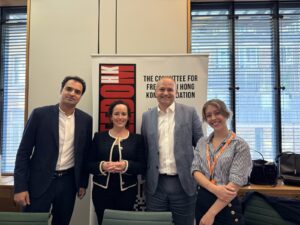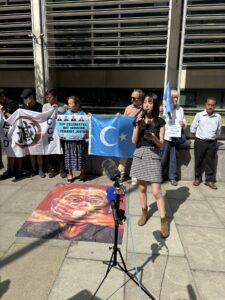Top News
On June 30, the National Security Law (NSL) turned five years old. Amnesty International published research showing that in more than 80 percent of 225 analysed cases, individuals were wrongly criminalised and should never have been charged. In nine out of 10 cases, individuals were denied bail and held for an average of 11 months in pre-trial detention.
The Committee for Freedom in Hong Kong (CFHK) Foundation and Human Rights Foundation launched a social media campaign condemning NSL repression and spotlighting New Zealand judge William Young for helping to maintain the illusion that the rule of law still exists in Hong Kong by joining its Court of Final Appeal. New Zealand legal publication LawFuel also called out Young for lending his prestige to persecution in Hong Kong.
The Hong Kong government issued a statement whitewashing the NSL’s impact that addresses several CFHK Foundation campaign issues, not least the sham trial and ill treatment of Jimmy Lai.
CFHK Foundation held an event in the British parliament, hosted by Labour Friends of Hong Kong Chairman Neil Coyle MP, discussing Hong Kong’s emergence as a hub for illicit trade, including weapons components destined for Russia and Iran, and what can be done to close loopholes in sanctions policy.
Our Strategy and Public Affairs Advisor Shannon Van Sant shared the Stop Corrupt Communist Party (CCP) Money Laundering Act (S.1339), introduced in the U.S. Senate by Senator John Curtis (R-UT) and Senator Jeff Merkley (D-OR), which calls for the U.S. Treasury Secretary to submit a determination to Congress on whether the U.S. should designate Hong Kong as a Primary Money Laundering Concern (PMLC) jurisdiction.
“Secondary sanctions targeting even a single bank facilitating illicit finance flows in Hong Kong would send a strong message for other lenders to clean up their act,” Van Sant said, adding that designating Hong Kong a PMLC jurisdiction would help raise awareness that its business environment has fundamentally deteriorated, posing new and elevated risks for foreign firms.
(Left to right) Henry Jackson Society Research Fellow Theo Zenou, CFHK Foundation’s Shannon Van Sant, Neil Coyle MP,
and Maria Nizzero, Principal, Head of Sanctions Policy at UK Finance ahead of our event in parliament.
Hong Kong
On July 1, Radio Free Asia (RFA) Cantonese ceased operations, halting 27 years of service and closing down one of the few remaining sources of accurate information about China available to Cantonese speakers. U.S. government funding cuts forced the outlet’s closure.
The government proposed tightening prison rules by granting the correctional department new powers to ban lawyers and religious leaders from visiting inmates. Provisions allowing people on remand awaiting trial to wear their own clothes and eat non-prison-catered food may also be rescinded.
Activist Lui Yuk-lin mounted a solo protest against imported mainland labour on the 28th anniversary of the July 1, 1997, handover of Hong Kong to China. CFHK Foundation marked the occasion on social media.
UK – Hong Kong
China was omitted from the top tier of the UK’s foreign influence registration scheme, designed to protect the nation from “covert foreign influence,” in a victory for London’s pro-Beijing engagement lobby.
Alex Sobel MP delivered a letter to Pope Leo XIV asking him to seek spiritual assistance for Jimmy Lai. It was signed by parliamentarians including Lord Alton of Liverpool, Baroness Helena Kennedy of the Shaws, and the last Governor of Hong Kong — Lord Patten of Barnes.
CFHK Foundation Junior Manager, Public Affairs and Advocacy, Chloe Cheung led a protest against the proposed China super-embassy in London that featured speakers including Lord Alton of Liverpool, Iain Duncan Smith MP, James Naish MP, and Blair McDougall MP.
CFHK Foundation’s Chloe Cheung joined parliamentarians and other civil society groups in a protest outside the UK Home Office against plans for a new Chinese super-embassy in London.
North America – Hong Kong
The Hoover Institute’s China’s Global Sharp Power newsletter recommended our “Hong Kong’s Greater Bay Area and the CCP’s Strategy to Influence U.S. State and Local Officials” report as a must-read, as did U.S. security analyst Matt Turpin’s China Articles Substack.
Jimmy Lai, ‘Troublemaker’ Updates
In conversation with Boise State Public Radio host Bob Kustra, CFHK Foundation President Mark Clifford shared the story of Jimmy Lai’s remarkable life, entrepreneurial success, and the tragedy of how he and Hong Kong lost their freedom.
🔥Flame of Freedom Blog
The Hong Kong National Security Law at 5: Unhappy Birthday
This article is authored by Thomas E. Kellogg, Executive Director of the Center for Asian Law, where he oversees programs related to law and governance in Asia. He is a leading scholar of legal reform in China, Chinese constitutionalism, and civil society movements in China.
“Five years ago, at 23:00 on June 30, 2020, Hong Kong’s nearly quarter-century experiment in autonomy ended: the National Security Law (NSL) went into effect, fundamentally transforming the city’s constitutional structures and core institutions in ways that continue to resonate up to this day. Hong Kong is no longer autonomous. Instead, it is run by ultra-loyalist Hong Kong officials and hundreds of mainland officials who live and work in Hong Kong. And it is no longer free. A city once known for its boisterous and caustic political debate is now mostly quiet, and its leading politicians have traded in colourful Cantonese barbs for leaden Communist Party-speak slogans.
The NSL was enacted to transform Hong Kong, and it has succeeded. Numbers can tell part of the story: since the law went into effect, 332 people have been arrested, and 165 have been convicted and imprisoned, according to the Hong Kong government. At least 90 civil society organizations have been shuttered between July 2020 and March 2024, along with more than 20 media outlets, according to a recent report I co-authored with two Hong Konger colleagues. A more recent analysis found that over 250 workers’ unions have been deregistered over the past five years. An estimated 500,000 Hong Kongers have left the city over the past five years, many of them fleeing the repressive political environment. They have taken up residence in the United Kingdom, Canada, Australia, Taiwan, and elsewhere.
But many of the most far-reaching changes cannot be quantified: how to measure the quality-of-life decline that stems from the much-diminished arts scene…?”
Read the full blog here.
Featured image credit: 2021 Vernon Yuen/NurPhoto via AP Photo


